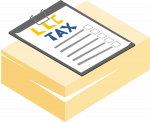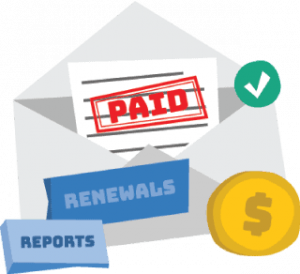New Jersey LLC Taxes
New Jersey’s high taxes can be daunting for business owners. Thankfully New Jersey LLC members have it a little easier than owners of other business types, due to the pass-through tax status LLCs enjoy by default. A flat $150 per partner filing fee for partnership taxes doesn't hurt either. However, members are subject to personal income tax at the state and federal level, and your LLC may also be liable for other taxes based on industry or workforce, as well as city or county taxes at the local level.
In this article, we'll cover:


How Are New Jersey LLCs Taxed?
The default federal tax status for your New Jersey LLC depends on its number of member owners. A single-member LLC (SMLLC) is normally taxed as a disregarded entity like a sole proprietor, and a multi-member LLC is taxed as a general partnership. These default statuses are pass-through taxes at the federal level: revenue is distributed to members and filed on their personal income tax at the 15.3% federal self-employment tax rate (12.4% for Social Security and 2.9% for Medicare), while the LLC itself pays no federal corporate income tax.
LLCs with default tax status file federal taxes with these forms:
- Single-member LLC—Form 1040 (usually Schedule C, but some SMLLCs file C-EZ, E, or F)
- Multi-member LLC—Form 1065
However, LLCs are not restricted to default tax classification—you can also choose to adopt S-corp or C-corp tax status for your LLC. Here’s how that choice affects your LLC’s taxes:
New Jersey LLCs taxed as S-corp
S-corp status is useful for certain LLCs—S-corps do not pay corporate income tax, and can make member distributions exempt from the 15.3% federal self-employment tax.
Your LLC can file for S-corp status with IRS Form 2553. Check the IRS S-corp requirements to make sure your LLC qualifies, as only US-originating companies within certain limits on shareholders and stock can become S-corps. S-corp tax returns (through IRS Form 1120-S) are also more complex than returns for default status. We recommend discussing the change with a CPA before electing S-corp status—since not all LLCs will save money as S-corps.
LLCs taxed as C-corp
It’s fairly uncommon, but some LLCs elect to be taxed as C-corps, which is the default tax status of corporations. C-corps suffer from “double-taxation,” paying 21% corporate income tax while shareholders are taxed on dividends. But LLCs looking for more investment and funding opportunities get access to a wider range of tax breaks through C-corps status than default LLCs or S-corps, and tend also to be more appealing to investors.
As when considering a S-corp, we recommend speaking to a CPA to see if your LLC will benefit from a change to C-corp status. C-corps report their income with IRS Form 1120.

New Jersey State Income Tax
Under default status filing as a partnership, LLC members report their income on personal income tax returns, and pay taxes on the income that passed to them through from the LLC at rates ranging from 1.4% to 10.75%.
However, LLCs with more than two members must pay a $150 partnership filing fee for each member—up to a $250,000 maximum. For LLCs with a member residing outside New Jersey, payment must be made on their share of New Jersey income—9% for nonresident partners that are part of a corporate structure, and 6.37% for non-corporate partners.
LLCs with S-corp status must pay a state Corporate Business Tax based on gross receipts: starting at 7.5% for a minimum of $375 for less than $100,000 in receipts, up to $1,500 at for receipts of $1,000,000 or more. C-Corps must also pay state Corporate Business Tax at slightly higher rates, starting at $375 for gross receipts starting at under $100,000, up to $1,500 for a million or more.
In addition, New Jersey LLCs and other pass-through businesses can elect to choose Pass-Through Business Alternative Income Tax as an another option. Under this election, members and partners of a pass-through company can have the LLC pay the Pass Through Business Alternative Income Tax on their share of distributions, then claim a refundable tax credit on their own returns.

Sales and Use Tax
New Jersey charges a statewide sales and tax of 6.625%. Unlike many other states, cities and counties can not add additional sales taxes on top of the state rate. You’ll need to register your LLC with the Division of Revenue and Enterprise Services to legally collect sales tax—registration carries a $125 fee for LLCs and other for-profit businesses, and you will need to display your Certificate of Authority for Sales Tax at your business location.

Local New Jersey Taxes
Some cities and counties in New Jersey impose taxes of their own on businesses, such as 1% payroll taxes in Jersey City and Newark. Alternatively, special taxes can be imposed on an area by the state government, like in the case of the 9% Atlantic City Luxury Tax on certain beverages, entertainment and room rentals. You will need to pay any local taxes applicable to your LLC in its home location, and in any other cities or counties where it conducts business.

Other Taxes in New Jersey
Here are some other taxes that are imposed by the state of New Jersey.
New Jersey State Employer Taxes
New Jersey employers must pay unemployment insurance and workers’ compensation taxes:
- Unemployment Insurance (UI) Tax—Employers are taxed up to a base wage of $41,100 for every employee (wages over that threshold are not taxed). For roughly the first three years that an employer is subject to the law, the unemployment tax rate is currently 2.8%. Afterwards, a rate between 0.6% and 6.4% will be assigned to the employer by the New Jersey Department of Labor and Workforce Development—Division of Employer Accounts every year. The rate is calculated based on the amount of unemployment taxes paid by (and unemployment benefits charged to) the employer, and their average taxable payroll.
- Workers’ Compensation—New Jersey employers are required to purchase workers’ comp insurance for all employees. Rates differ based on claim history and the risk involved in the work your employees do, but New Jersey’s estimated average rate is $1.45 per $100 of payroll.
To learn more about New Jersey employer taxes, visit the New Jersey Division of Taxation Employer Payroll Tax website.
Industry Taxes
The New Jersey Division of Taxation also issues taxes on certain industries and regulated substances in the state, including:
- Alcoholic Beverages
- Cannabis
- Cigarettes
- Hotel/Motel Occupancy
- Litter Control Fees
- Motor Fuels
- Petroleum Products Gross Receipts
- Realty Transfers
- Recycling
- Sanitary Landfills
- Tobacco and Vapor Products

Do foreign LLCs in New Jersey need to pay New Jersey taxes?
Yes. If you have an New Jersey foreign LLC (an LLC doing business in New Jersey formed outside the state) you still need to pay all applicable New Jersey taxes as domestic LLCs do, including local-level city and county taxes.





